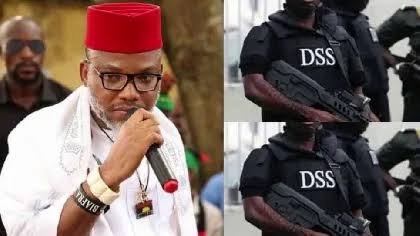Former Attorney-General of the Federation (AGF) Kanu Agabi (SAN) yesterday told the Federal High Court in Abuja that he was not denied access to Indigenous People of Biafra (IPOB) leader Mazi Nnamdi Kanu.
The lead counsel faulted a claim by a member of his legal team that officials of the Department of State Services (DSS) blocked him from seeing Kanu.
Agabi spoke at the resumed hearing in Kanu’s terrorism trial while responding to an enquiry by Justice James Omotosho on whether or not it was true that the information attributed to a member of the defence team, Alloy Ejimakor, was true.
According to the judge, Ejimakor posted on one of his social media platforms that the DSS denied Kanu’s legal team access to him. While responding, Agabi said none of such happened. He blamed Ejimakor for the mix-up and commended the conduct of the DSS officials whom he said were very respectful and courteous. Agabi said: “I was not denied access to the defendant. We had arranged to go there with my team. But for some reason, they were not available. “When I got to the gate around 1pm, they said our name had not arrived. To be fair, they (the DSS officials) showed me enough respect. I said I will come back another date,” he said.
He added that he was surprised and became angry when he learnt that a member of his team went to put on the internet that he was not allowed access to the defenfant.
When asked by the judge what informed his decision, Ejimakor said he thought Agabi was angry that he was denied access to Kanu when they spoke on the phone, a position the ex-AGF countered and explained that he got angry because Ejimakor gave him the wrong time for the appointment.
Ejimakor said although the team’s appointment with the DSS was 2pm, he told Agabi and others to come by 1pm.
He said when he arrived at the DSS’ gate by 2pm, he was allowed in and had interaction with Kanu unhindered.
Ejimakor added that when he came out of where he met Kanu, he placed a call to Agabi to find out why he was not available, but that the ex-AGF sounded angry, which made him conclude that he (Agabi) was angry because he was denied access.
Agabi then faulted Ejimakor’s explanation and said he became angry because Ejimakor failed to answer his calls.
The ex-AGF said: “When I got to the gate at 1pm, they (DSS officials) checked our names and they said the names were not there. I called him (Ejimakor) twice and he did not pick and I left.
“I left because I had another appointment at the gulf club. He (Ejimakor) called me later and asked me to come back. That was why I was angry,” Agabi said.
In his intervention, Justice Omotosho said: “I will say this without hesitation. You have not acted professionally. You are a senior counsel. Please learn to act accordingly.”
Justice Omotosho said he brought the incident up because he thought the defence lawyers were denied access to the defendant.
Prosecuting lawyer, Adegboyega Awomolo (SAN), commended the judge for his intervention which helped to shed light on what actually happened.
He admitted that the defendant has been in detention since he interrogated him in 2021.
As against claim by Agabi that Kanu has become an angry, frustrated and unhappy man, almost mad because of his prolonged detention, the witness said the defendant did not exhibit such traits when he appeared before them on July 17, 2021.
He also denied knowledge about why the prosecution amended the charge against Kanu many times.
he witness said he did not confront the defendant physically with the AGF, who wrote a letter demanding Kanu’s investigation for alleged terrorism activities.
He said: “We confronted him (the defendant) with the letter of the AGF, raising allegations against the defendant. We did not confront the defendant with the AGF and other persons who made allegations against him.”
The witness said he was aware that the governors of the Southwest states formed Amotekun to protect the region.
On whether the AGF wrote the DSS to investigate the formation of Amotekun, the witness said it was not all letters sent to the DSS that he saw.
Agabi sought an adjournment to enable him to retrieve some documents from the police, which he said would aid the defendant’s preparation for his defence.
Although the prosecution rejected the defence’s request for adjournment, arguing that it was unmeritorious, Justice Omotosho said he would grant the adjournment sought because the defendant was entitled to be afforded sufficient time and facilities to prepare for his defence.
The judge, however, advised the defence to make good use of the time accorded it and avoid delay.
He adjourned till May 21 for continuation of trial.











